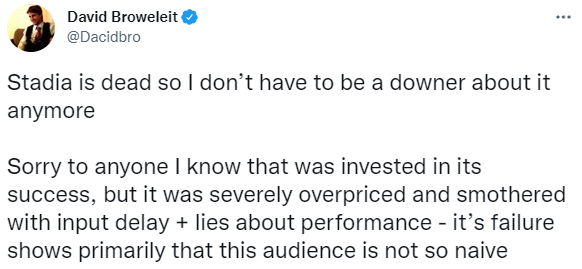After a short-lived, troubled tenure, the Google Stadia service is finally being shut down and there seem to be plenty of reasons for this.
It wasn't very long ago that Google assured everyone Stadia is here to stay.
Unfortunately for them, that statement hasn't aged well. The Silicon Valley giant published a blog earlier today stating they've begun the wind-up process for the cloud gaming service.
The Stadia streaming service will be shutting down on January 23, 2023. Google is issuing full refunds for any stadia hardware, games, and DLC content that players purchased. These refunds will be processed by mid-January.
So what went wrong? Google is a mammoth in the tech industry. Despite this, their biggest foray into gaming industry completely backfired. They had many gamers enticed with the prospect of playing AAA games without needing expensive hardware. Well, until they launched the product and it just didn't work. Not many gamers liked it.
From hype to indifference

When it comes to gaming hardware, gamers like to wait for benchmarks and post-launch feedback to make an informed purchase decision. Stadia turned out to be a bad one, or at least a "wait until it gets better" one.
The service was underwhelming at launch. It didn't have many good games to offer and many players experienced issues like input lag and connectivity problems. Ultimately, they failed to justify the exorbitant subscription price for an untested product and the hype quickly turned into indifference.
Google invested way too much on some games
Google's ideal approach towards steadying the ship would have been to invest in improving infrastructure and making the platform accessible. The main reason players disliked the service was all the technical problems. Most countries lack the infrastructure to make a service like Stadia feasible. It takes a really fast internet connection to run AAA titles with passable playability.
Consoles and PCs were just better for consumers. Competitors like xCloud and GeForce Now focused on improving their infrastructure to run games better, while being better priced. Meanwhile, Google spent its big bucks on getting a handful of AAA titles to the platform — despite all the complaints about how big games run poorly on it.
An atrocious pricing model
When Google announced Stadia, an enthusiastic audience believed it would be like the "Netflix" of video games. Essentially, many of them assumed they'd pay a monthly or annual subscription fee and gain access to a library of games. Problematically, that wasn't the case.
Players would only receive one game per month. These free titles were usually indie titles or old games that were released a long time ago. The idea of purchasing entire AAA games, despite paying a subscription fee for the service just isn't ideal. In a world where Xbox Game Pass and now, PlayStation Plus Premium exist, there just isn't a good reason to invest in Stadia.
The competitors are just way better

On that note, competition for Stadia showed up quickly after its announcement. For a brief moment, Google seemed to be the pioneer of video game streaming, leading the charge by conceptualizing Stadia. At least until Microsoft revealed xCloud and Nvidia's GeForce Now showed up.
Additionally, Microsoft launched its Xbox Game Pass subscription service, which was a game-changer. It had hundreds of games playable for a monthly or annual subscription fee, exactly what people thought Stadia was going to be. Why pay $70 for a single AAA game when you could play many of them through a subscription?
Eventually, Sony showed up, overhauling its own PS Plus and PS Now subscriptions by merging them. Even Netflix announced Netflix Gaming.
Stadia will shut down in January
While Stadia's approach to streaming games for consumers was built on a strong technology foundation, it hasn't gained the traction with users that we expected so we’ve made the difficult decision to begin winding down our Stadia streaming service.
Stadia is at the end of its road and we have no choice but to wave goodbye to it. It's weird that Google insisted Stadia wasn't shutting down just over a month ago. Then again, it's only indicative that this decision wasn't an easy one to make for them, but comes as a surprise, nonetheless. Services will go offline on January 18, 2023.